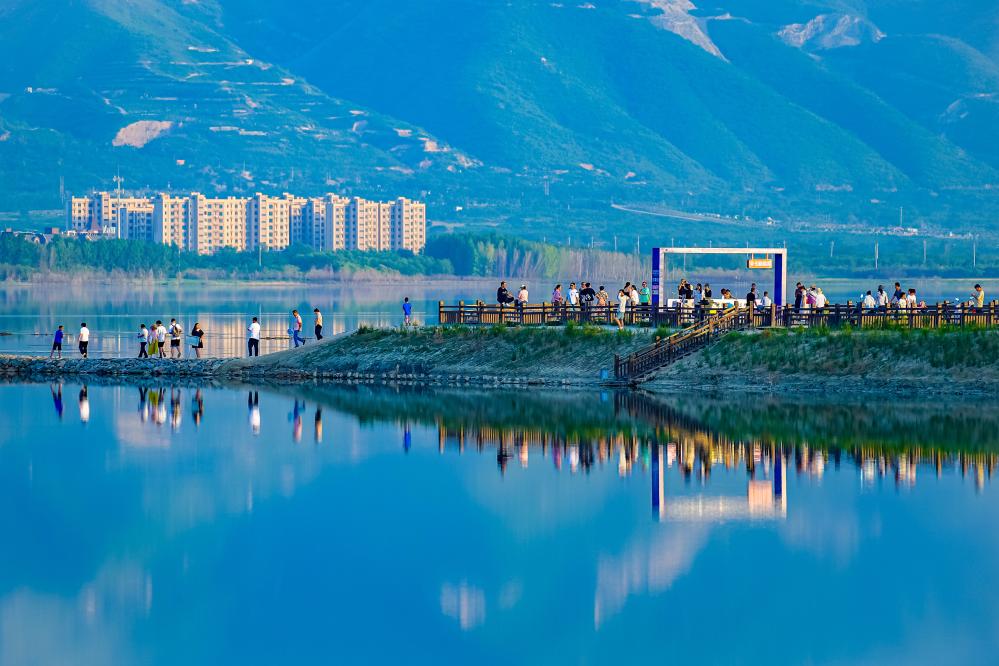Beyond Green

Combining the integration of Indigenous worldviews and legal framework, with an ambitious foreign and industrial policy, could pave the way for an eco-civilization with Latin American characteristics.
What role will Chinese trade and investment play in Latin America’s climate and sustainability efforts, particularly in Chile?
To address this question, let’s explore an unconventional comparison through two recent science fiction films—one from China and one from the U.S.—which offer distinct visions of humanity’s future relationship with nature.
In Avatar 2, a multi-planetary corporation exploits a pristine planet whose inhabitants, clearly inspired by Latin America’s Indigenous peoples, resist to protect their way of life. While the film concludes with a triumph of nature over industry, it does convey a grim message: Industrial development and environmental harmony are mutually exclusive, presenting a “pessimistic dystopia” where progress leads to ecological destruction.
Conversely, The Wandering Earth 2, a Chinese blockbuster based on sci-fi author Liu Cixin’s novella, portrays humanity uniting in a massive engineering project to move planet Earth to a new solar system, as the Sun is burning up and about to destroy Earth. Here, technology, state planning and international cooperation save the world, reflecting China’s vision of eco-civilization—an “optimistic dystopia” aligned with the ethos promoted by the Communist Party of China (CPC) since 2012.
These cinematic narratives, though fictional, offer insights into the contrasting approaches that may shape China’s role in advancing sustainability in Latin America, specifically in Chile.
The paradigm
Over the past decade, China has often been seen as a global leader in the fight against climate change, a reputation that canters around the idea of “eco-civilization.”
Zhang Yongsheng, a researcher at the Chinese Academy of Social Sciences, explains eco-civilization as a new way of developing economically that aims to reconnect humanity with nature, a relationship that was disrupted during the industrial age. But this doesn’t mean giving up on technology. Instead, eco-civilization thrives on innovations emerging from the “green transition.”
Proponents of eco-civilization consider it an alternative to Western sustainability theories, which they argue are inherently flawed because they’re rooted in neoclassical economic theories. Such Western theories are often criticized for being too focused on human-centered concerns, materialism, consumerism and individualism.
Eco-civilization is positioned as China’s answer to the West’s economic individualism, with the latter viewing nature as a commodity and environmental damage as a mere externality. This concept is deeply rooted in China’s ancient philosophical traditions, standing in stark contrast to the liberal economic theories that emerged in the West during the Industrial Revolution.

Since its introduction into the CPC’s Constitution in 2012, and later into the People’s Republic of China’s Constitution in 2018, eco-civilization has spurred institutional and legal reforms.
These include the establishment of environmental courts, the creation of new environmental offenses, increased accountability for officials, and the development of a “green GDP.” Public investment in research and development (R&D) for green energy and strategic sectors further demonstrates China’s commitment to this vision.
The limits
Eco-civilization faces challenges in Latin America, both in theory and practice.
One major concern is whether it truly represents a new way of thinking. Critics like British geographer David Harvey and American anthropologist David Graeber argue that eco-civilization might be just another “fix” to sustain economic growth.
From this perspective, China’s eco-civilization aims to boost economic growth through green technologies like solar panels and electric vehicles, both domestically and through exports. In this sense, the environmental crisis becomes an opportunity.
The green transition is expected to generate wealth by tapping into resources like critical minerals—lithium, copper and nickel. This exploitation needs a strong infrastructure network. However, if countries like Chile don’t advance their industrial capabilities, they could end up stuck in a semi-peripheral position in the global economy, merely exporting raw materials without adding value—something American sociologist and economic historian Immanuel Wallerstein would argue.
Moreover, the term “civilization” suggests that China is moving beyond the nation-state model, which some see as outdated for tackling the environmental crisis. This idea contrasts with French philosopher Bruno Latour’s view of civilization as a “mode of existence,” which calls for redefining our relationship with nature by acknowledging its rights and agency.
Like other Chinese public policies, the story of eco-civilization progresses from the provincial level to the national and finally to the international stage. But with eco-civilization, the step to foreign policy remains to be seen.
Global demand for critical minerals like lithium, copper and nickel is on the rise, driven by the energy transition and electromobility policies of major powers aimed at reducing greenhouse gas emissions. With the right approach, a country like Chile could benefit from the competition among these powers by navigating the changing geopolitical landscape, where trade and investment decisions are increasingly influenced by political factors rather than just economics.
In this context, efforts toward an ecological civilization seem promising. But what about Latin America? Can we envision an eco-civilization with its own Latin American characteristics?

Unique characteristics?
Studies on foreign investment and the environment often highlight a common issue: The real challenge lies not just in theory, but in dealing with the limitations of institutional capacity.
This problem is tied to traditional aspects of economic administrative law that focus on individual states rather than the global community. Key areas affected include urban planning, land-use planning, administrative regulation and fair competition in public procurement. These are areas that Chile’s current economic model has often overlooked, sometimes even more so than industrial policy.
Reports from the University of Chile illustrate this issue well. For example, the Rucalhue Hydroelectric Plant, a project by China Three Gorges Corp., a major player in China’s energy infrastructure, the purchase of Chilean electricity distribution company Compañía General de Electricidad by the Chinese state-owned power transmission network operator State Grid Corp. of China, and foreign direct investment in Chile’s salmon and cherry industries all point to a common problem. The environmental damage and social conflicts in these cases are often due to the Chilean state’s inability to manage these challenges effectively, rather than the actions of the investors.
In sum, there is no need to “reinvent the wheel.” Chinese foreign investment can benefit the environment if accompanied by a capable administration that fosters productive capacities and facilitates technology transfers. Chile can learn from the eco-civilization paradigm to chart its course toward rebalancing the relationship between humanity and nature.
Practically speaking, the free trade agreement between Chile and China could be updated to require local producers of minerals and agricultural products to lift environmental production standards. This could incentivize local companies to export high-value products, such as certified sustainable fruits, fish, meat or nuts.
Last but not least, in Chile and across the region, the recognition of Indigenous peoples’ collective and individual human rights has led to legal victories that help preserve their ancestral ways of life. However, more must be done to fully integrate Indigenous worldviews into our legal framework. By combining this integration with an ambitious foreign and industrial policy, this could pave the way for an eco-civilization with Latin American characteristics.
The author is an assistant professor of international studies at the Institute of International Studies, University of Chile.
 Facebook
Facebook
 Twitter
Twitter
 Linkedin
Linkedin
 Google +
Google +










